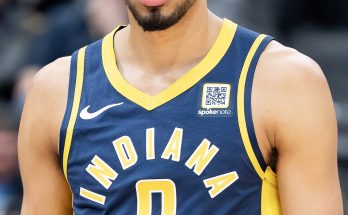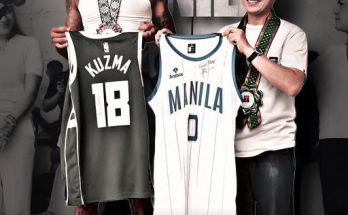There are moments in sports history when success is forever intertwined with controversy, and no amount of wins can wash away the stain. For Alabama basketball, a program that has ascended in recent years to national prominence on the court, that moment came not with a buzzer-beater or a Final Four berth, but with the crack of a gunshot on a cold January night. And for all the triumphs that followed—the packed arenas, the accolades, the draft buzz—one truth remains: guns and murder now stain the legacy of Alabama basketball in a way that cannot be ignored or easily forgiven.
Jeff Goodman, one of the most respected voices in college basketball journalism, didn’t mince words when he recently revisited the tragic events surrounding the death of 23-year-old Jamea Jonae Harris. Harris, a young mother, was shot and killed on The Strip in Tuscaloosa, Alabama, in the early hours of January 15, 2023. The incident didn’t just rock the local community—it sent shockwaves through the entire college basketball world because of the names attached to it.
Former Alabama player Darius Miles was quickly charged with capital murder, along with his friend Michael “Buzz” Davis, in connection with Harris’s death. Prosecutors allege that Miles provided the gun that Davis used to shoot Harris following an altercation. The incident occurred just hours after Alabama had hosted LSU in a high-profile SEC matchup. The fact that a player from one of the top-ranked programs in the country was now embroiled in a murder case was enough to draw national headlines. But what escalated the firestorm was the revelation that Brandon Miller, the team’s freshman star and projected NBA lottery pick, had delivered the gun used in the shooting—at Miles’ request.
According to law enforcement testimony during a preliminary hearing, Miles texted Miller to bring him his firearm. Miller complied. Not only was this confirmed under oath, but police also noted that Miller’s vehicle had blocked in the Jeep that Harris and her boyfriend were sitting in when the shots were fired. For many, this seemed to suggest at least some degree of complicity. Yet, Miller was never charged with a crime. Law enforcement officials said there was not enough evidence to warrant criminal charges against him.
The University of Alabama’s response to Miller’s involvement—or lack thereof—became one of the most criticized decisions in modern college sports. Miller faced no suspension. He continued to play and was, in fact, one of the driving forces behind Alabama’s march to an SEC title and No. 1 overall seed in the 2023 NCAA Tournament. In postgame press conferences, Alabama head coach Nate Oats referred to Miller’s situation as being “in the wrong spot at the wrong time.” The backlash was immediate.
Goodman, like many others, questioned the optics and ethics of allowing Miller to continue playing. “This isn’t a situation about a missed class or a team violation,” Goodman said. “We’re talking about a young woman who is no longer alive, and one of Alabama’s players was directly involved in delivering the weapon. Even if he didn’t pull the trigger, the idea that there were no consequences—not even a single missed game—sends a dangerous message about what matters most to a program.”
Indeed, that message was hard to ignore. In many ways, it appeared that winning had been prioritized over accountability, that protecting a potential top-5 NBA Draft pick was more important than confronting the moral gravity of what had occurred. The media circus intensified when, during a pregame player introduction, Miller mimed a pat-down ritual with a teammate—a tone-deaf gesture that drew universal condemnation. Oats apologized afterward, claiming the routine had been going on all season and was not connected to the case, but the damage had already been done.
For a program trying to solidify itself among the elite in college basketball, the situation cast a long shadow. Miller was eventually drafted No. 2 overall by the Charlotte Hornets and had a strong rookie season in the NBA, but the questions about that January night haven’t disappeared. Nor should they. Harris’s family continues to mourn, their pain deepened by the public platform granted to a man they believe played a role—however indirect—in her death.
Jeff Goodman’s pointed assessment reminds us that sports cannot exist in a vacuum, separated from the real-life consequences of the people who play them. “It’s not just about Alabama or Brandon Miller,” Goodman said. “It’s about the values we claim to hold in college athletics—integrity, character, accountability—and whether those values are real or just words we use when they’re convenient.”
Alabama’s administration and athletic department have defended their handling of the situation, noting that they fully cooperated with law enforcement and followed legal guidance in determining Miller’s eligibility to play. But legality and morality are not always the same thing. There is no rulebook for how to navigate a situation this complex, but the decision to do nothing—to keep playing games as though nothing had happened—felt to many like a betrayal of basic decency.
There was a moment, late in the 2023 season, when Alabama looked destined to reach its first-ever Final Four. With Miller leading the way, the Crimson Tide dominated much of the SEC and entered the NCAA Tournament with a target on their back. But in the Sweet 16, they were eliminated by San Diego State in a stunning upset. It was a fitting end to a season where talent and controversy walked hand-in-hand. No amount of on-court brilliance could erase what had happened off it.
Today, Alabama basketball finds itself in a strange position. The program is still relevant, still successful, and still recruiting at an elite level. But its reputation has been irreversibly altered. Fair or not, every future win will be weighed against that night in January, against the image of a program that chose to look forward instead of inward.
Goodman’s critique is not an attack on Alabama’s basketball accomplishments. It is a reckoning. It is a demand that we, as fans and observers, refuse to let athletic greatness serve as a shield against ethical scrutiny. Because when a life is lost—when a young mother is taken from her child—there should be consequences. Not just in a courtroom, but in the culture that allowed it to happen without pause.
In the aftermath of the tragedy, the broader college basketball world had a choice: speak up or stay silent. Some, like Goodman, chose the former. Many others chose the latter, unwilling to challenge the machine of big-time athletics. But silence is not neutrality. It is complicity.
And so here we are, more than two years removed from that night, still wrestling with its fallout. The trial for Darius Miles continues, and the Harris family continues to grieve. Brandon Miller has moved on to the NBA. Alabama keeps winning. But the question remains: at what cost?
When future generations look back at this chapter in Alabama basketball history, they won’t just see the wins or the rankings. They’ll see a moment when the soul of the sport was tested—and, in the eyes of many, found wanting.
Goodman’s words are a stark reminder that college basketball, for all its pageantry and passion, is still susceptible to the same flaws that plague every institution—ambition without accountability, success without sacrifice. Until that changes, the legacy of Alabama basketball will forever carry a blemish no banner can cover.



